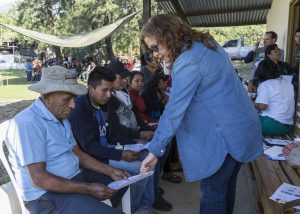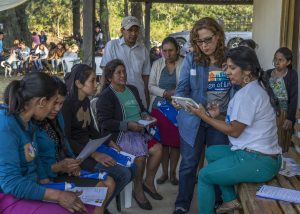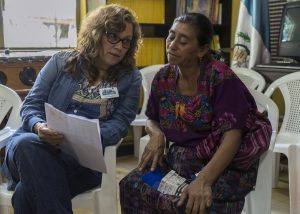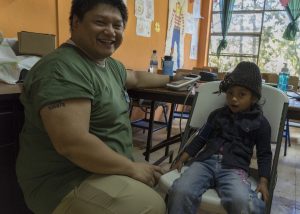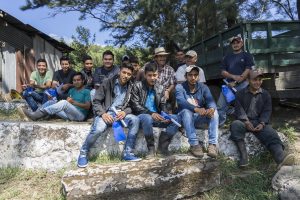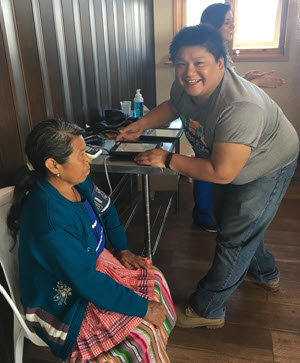Bridge of Life Up Close
What I Learned from Educating Guatemalan Coffee Farmers on Kidney Disease Prevention
I signed up with Bridge of Life (BOL) as a volunteer because I felt the need to do something with extra meaning in my life. As a younger woman, I had the chance to travel South America and dabbled a bit in family planning and breastfeeding education, and, boy, did I feel an enormous sense of reward. So I was thrilled when I received a call for an interview from BOL and even more thrilled when I found out the mission would be to Guatemala.
I had visited Guatemala about 20 years ago, just as their civil war was ending. I was a tourist inspired by the love of beautiful textiles, the Incaparina case study in college (a study on nutrition) and my Guatemalan friends and patients in Los Angeles. They expressed their love of country with a mixture of pride and sadness for the conditions they fled back home. I had to experience Guatemala for myself. As I travelled from the most “touristy” places, such as Tikal, to some of the smallest towns in Huehuetenango, I kept telling myself I would come back some day but in a different capacity. I hoped to put a little grain of sand in the construction of a brighter future for those who struggle to create a better life for their families. I have been fortunate enough all of my life to have food, clean water, a home, access to healthcare, and more, so this opportunity was a reminder of how many people in this world still live in poverty and do what is needed to survive.
The experience on the coffee farm in Guatemala was very personally rewarding, a dream come true and then some. Our days on this chronic kidney disease screening mission started early, with station set-up at designated locations. Shortly after, the flow of patients started and didn’t stop until the last person was seen, usually in the late afternoon. I helped a for a short time at the registration desk but was then assigned to the preventative education station, where I would remain all three days having one of the best times of my life, despite how exhausted I was.
I felt that the participants were highly appreciative to learn their screening test results and information on how to better maintain their kidney health. And I trusted that most people who I saw would make at least some change in their lives and that of their families based on this education. Sometimes those small changes can make a great difference in the long run, and that belief fueled my energy to do justice to their needs.
As with most education, I also began to learn new things even as the teacher, but in this case the lessons were so very humbling. When I tried to educate on drinking more water, I learned that not all water is “equal.” There is “pure water,” and then there is gaseosa or “Coke water” – the preferred drink since most of the workers have limited access to good drinking water. And, if you are going to buy bottled water, you might as well get the sweet stuff and get some pleasure out of it (and for most, some much needed calories). When I tried to teach about integrating more vegetables into diets, I learned the names of the green, leafy vegetables that these individuals consume and that most people really enjoy them, but there is not enough water to grow them at home, and vegetables from the market often spoil within two days. When I tried to talk about the need for protein, I learned that most eat “vegan,” but only by necessity, not by choice. And I learned that one chicken can feed 10 people but is a luxury meal that’s reserved for once a week (maybe).
When I tried to educate participants about their lab results, I learned that many individuals had never even seen a doctor, and if they had, that lab tests and results were never explained to them (if they even received any tests at all). As I continued to provide preventative education, I learned that these individuals appreciated silly jokes by shyly laughing as I tried to make them feel more comfortable in a didactic environment that they were unfamiliar with. Getting a formal education is not much of an option in a society where people are put to work at a very early age to help their family survive.
But perhaps the greatest thing I learned is that, despite their struggles, the rich Mayan culture of these people shines through. With only a few handfuls of beans and some corn tortillas to sustain them, the women wrap themselves in their beautiful, colorful huipiles, the men prepare themselves for the day, and they all make the long, daily trek to the coffee farm motivated by the love of their children and families.
A Stirring Reality: Screening Guatemalan Coffee Farmers for Kidney Disease
 Chronic kidney disease is becoming a common illness in rural areas of Guatemala and particularly for agricultural workers due to factors such as long workdays, limited access to proper hydration and work labor.
Chronic kidney disease is becoming a common illness in rural areas of Guatemala and particularly for agricultural workers due to factors such as long workdays, limited access to proper hydration and work labor.
As part of our Screening & Prevention Program, Bridge of Life (BOL) is working with in-country partners to provide chronic kidney disease screenings to different agricultural workers, such as coffee farmers and banana plantation workers, in Guatemala. In March 2017, BOL and a team of volunteers traveled to Antigua, Guatemala and screened over 800 coffee farmers and their families for chronic kidney disease over World Kidney Day at Bella Vista Farm.
Read about our team’s firsthand experiences in the field, conversations with the coffee farmers and our volunteers’ own personal stories in our blog series from this mission, A Stirring Reality: Screening Guatemala Coffee Farmers for Kidney Disease. Check out the first two chapters, and stay tuned for future chapters announced on our Facebook page!
Chapter 1
“Screening in Guatemala: A Firsthand Account of the Daily Lives of Coffee Farmers,” by Katie Chandler, Program Director of Operations, Bridge of Life
Chapter 2
“True Life: I Work on a Coffee Farm,” by Jesse Casco, Patient Care Technician, DaVita Kidney Care
True Life: I Work on a Coffee Farm
It was halfway through the first day of Bridge of Life (BOL)’s chronic kidney disease (CKD) screening event at Bella Vista Farm in Antigua, Guatemala, when it dawned on me—“I thought I knew, but I had no idea.” Yes, it was an episode of MTV’s True Life. For those of you who aren’t familiar with it, True Life is a long-running television show which documents specific life experiences and the people living them. This week’s episode was titled, “True Life: I Work on a Coffee Farm.”
Uncertainty is a catalyst for speculation. This being my first shot at world health services, my expectations from a medical mission like this one weren’t specific. I had created wonderful stories in my head of how simple and scientific this trip was going to be. CKD is an epidemic in this region, and we were going to gather data and get to the bottom of it. And, on the way, we’d help educate and treat those in need. Sounds easy, doesn’t it? I mean, I like helping people. The idea of simple was eviscerated when I began taking vitals for the first of many coffee workers’ children.
I asked the first child, “Wait, you’re 15?” He replied, “Yes.” With a smile, I asked if he was just hanging out with his mother or father today. He replied, “No,” which led me to ask, “Do you work here?” The boy looked at me, smiled and said proudly, “Yes!” My next question was, “For how long?” “Three Years,” was his response. I was completely naïve to the idea that it was commonplace for people in this area to begin working on a farm at such a young age. At 15, I was attending high school, and the only labor I endured was taking out the trash, cleaning my room and washing dishes from time to time.
I also encountered a young man who asked me about my Star of Life tattoo on my right arm. The man asked if I was a firefighter, and I replied, “Yes, a volunteer.” The young man’s face lit up: I symbolized something to him, which filled him with pride. He, too, was a volunteer firefighter, but in Alotenango. And on this day, he connected with someone from a completely different world, but with the same passion. We shared photos of our fire trucks and squad members and a few stories. At first, I wasn’t sure what to make of this interaction, but I was still early on in the week’s journey.
As the days progressed, glimmers of our work’s progress were evident. The most luminous example for me occurred on the way back from the farm. I was in a car with three other volunteers, and we were reminiscing on a job well done for the week. Our driver received a call, and after hanging up, mentioned that a woman we screened earlier in the day made it to the hospital in Guatemala City. To be honest, I had been completely caught up in the collection of data and future interpretation – analyzing data is a habit of mine. But I had heard about a patient who, after all of our tests, showed strong evidence of Stage 5 kidney disease. The driver mentioned she would receive dialysis treatment and was impressed that, without this screening, she would have had no knowledge of her health which may have led to her passing. In the moment of silence that followed, I reached a level of certainty that erased all my speculation: this was the impact that our team had on the people here. It wasn’t just the data that we needed. It was the support we were giving the people here that was impactful. In that moment, who cared about the data? I didn’t—in fact, I said, “We saved someone’s life today.”
I reflect on a week that I’ll never forget. In fact, I’d like to expand on what our team did in Guatemala this week. I’d like to see how far our impact can truly reach. After all of the interactions I’ve had with the people and workers in Guatemala, I have a much more certain understanding of BOL’s goal: we gave these people life, and in return, they gave us life. The level of fulfillment from that realization is astonishing. I walked into this mission with one expectation and left with a completely different and humbling one.
Screening in Guatemala: A Firsthand Account of the Daily Lives of Coffee Farmers
 Each morning, thousands of Guatemalan farmers wake up long before the sun has started to rise to make the three-hour trek to coffee plantations outside the city of Antigua. Many are mothers with their young children swaddled in aguayo (a woven blanket used to carry items) strapped to their backs. They slip on their plastic chinelas (flip-flops), fill their recycled Coca-Cola bottles with water from their shallow well and begin the long, familiar hike down the dark dirt road. The farmers know this journey well: many first started down this same path when they were on their own mothers’ backs. Days on the farm stretch until the sun is ready to set, and the workers make the same hike back home in the evening. They are lucky to catch six hours of sleep before it is time to do it again.
Each morning, thousands of Guatemalan farmers wake up long before the sun has started to rise to make the three-hour trek to coffee plantations outside the city of Antigua. Many are mothers with their young children swaddled in aguayo (a woven blanket used to carry items) strapped to their backs. They slip on their plastic chinelas (flip-flops), fill their recycled Coca-Cola bottles with water from their shallow well and begin the long, familiar hike down the dark dirt road. The farmers know this journey well: many first started down this same path when they were on their own mothers’ backs. Days on the farm stretch until the sun is ready to set, and the workers make the same hike back home in the evening. They are lucky to catch six hours of sleep before it is time to do it again.
In the fields, the farmers work relentlessly, rarely taking a break as they can earn 50 quetzales (roughly $6.50) in a day if they can pick 100 pounds of coffee – a nearly impossible task. They turn to their children to help meet their quota. The children pitch in eagerly, not knowing that most of them will continue working in the fields until eventually their callused, crippled hands have grown too old to do the work.
Bridge of Life (BOL) had the opportunity to spend three days at Bella Vista Farms to host a kidney disease screening for 811 coffee workers. We tested blood pressure, urine and blood. We held health education workshops for the farmers to better understand their health results and learn the causes behind some of their poor health conditions and how to improve related behavior. Patients at risk saw a nephrologist and received any necessary medication for free. We learned that the farmers’ work takes a toll on their health. Hypertension, likely caused from stress, is a reality for far too many. Many of the farmers also suffered from diabetes. Health issues are ignored, or perhaps they just never recognized the wa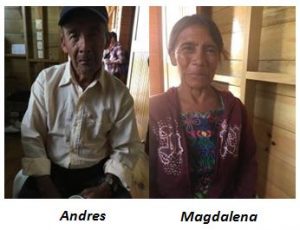 rning signs.
rning signs.
Several of the farmers shared their personal lives and stories with us:
Andres is 75 years old and doesn’t know any life other than one working in the fields.
Magdalena still picks coffee at 62 years old. She can’t quite remember when she started, but is certain that it’s been more than 50 years.
Mirian is 24 years old. She attended school only through the third grade. She has two children. She makes the three-hour hike to work with her youngest tied to her back and her oldest on her hip. While she works, the two children play under the shade of the coffee trees. She wants another life for her children, but admits that her toddler already knows how to pick and has started to help her in the fields.
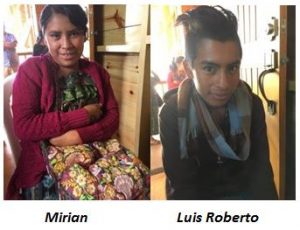 Luis Roberto is a stylish 18-year-old young man. He started working full time on the plantation at 13. “I left school for my family,” he said. “That’s what we all have to do for our families.”
Luis Roberto is a stylish 18-year-old young man. He started working full time on the plantation at 13. “I left school for my family,” he said. “That’s what we all have to do for our families.”
These farmers’ situations are not isolated cases. Their stories are similar – ones that are replicated and re-played among generations of farmers, where young children are willing to put their own dreams aside to help their mamá or papa meet their 100-pound quota and the cycle of poverty continues. People never start or drop out of school to find a job in agriculture.
The level of poverty the farmers experience became very evident when I asked Fidelia, a 30-year-old woman, if she has access to clean water at work. She responded very nonchalantly: “We can get water to drink at work when rain falls from the sky. Otherwise, we have to bring it from home.”
Our team also saw firsthand the consequences of illness that went undetected for far too long…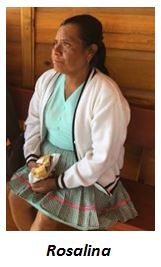
Rosalina is 53 years old. Despite the fact that her mother is diabetic and her father is hypertensive, she rarely thinks about her own health. A day without work means a day without food, and so Rosalina, like most of the other farmers, ignored the warning signs. The weeks before we arrived in Antigua, Rosalina’s health took a turn for the worse. She started vomiting and feeling dizzy and fatigued. Her vision blurred. Still, Rosalina went to work each day. After screening Rosalina, we learned that she was living with Stage 5 kidney disease and didn’t know it. Our team counseled Rosalina about her health and sent her in an ambulance to Guatemala City to get the healthcare services she needed. In this case, our screening program was not just a matter of prevention – it offered lifesaving treatment.
Currently, there is no identified cause of chronic kidney disease (CKD) among agricultural workers. Unlike normal cases of CKD, CKDu (chronic kidney disease of undetermined causes) has a rapid onset with proteinuria and albumin (usually early indicators of kidney disease) noticeably absent until later stages of the disease. Many speculate that it is caused by heat stress, dehydration or pesticides. Perhaps it’s the combination that creates the perfect storm.
What is for certain is that this new form of CKD needs continued research. The farmers already face so many challenges and, for most, treatment is out of reach. BOL is committed to working alongside these farmers to understand the causes of and solutions to this fatal disease. The road may be muddy and long…but we will get there!
COMING SOON! Stay tuned for our next chapter in this blog series …
True Life: I Work on a Coffee Farm, by Jesse Casco, Patient Care Technician, DaVita Kidney Care
Find the link on BOL’s Facebook page
